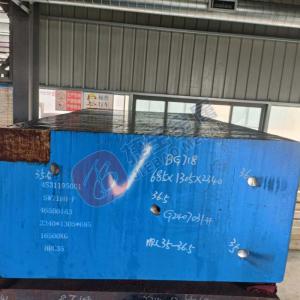Supplier: SHANGHAI JIEBAO METAL CO.,LTD
Address: No. 2518, Shebei Highway, Sheshan Town, Songjiang District, Shanghai 2 Building-1
Country: China
Mold Steel Applications You Need to Know About
Price: 1
https://www.jiebaosteelgroup.com/productstags/mold-steel-applications-you-need-to-know-about.html
Mold steel is a crucial material in various industries, particularly in manufacturing processes that require the creation of molds for shaping materials such as plastics, metals, and rubber. This type of steel is specifically engineered to handle the high pressures, temperatures, and stresses that come with the molding process. As industries grow and technology advances, the applications for mold steel continue to expand.
What Is Mold Steel?
Mold steel, also referred to as tool steel, is a type of steel designed specifically for the manufacture of molds and tools. These steels are known for their hardness, durability, and ability to withstand high-stress conditions. Mold steel is commonly used in the production of molds for plastic injection molding, die casting, compression molding, and blow molding. It is designed to have high resistance to wear and deformation, making it ideal for high-performance applications.
The key characteristic of mold steel is its ability to maintain its integrity at high temperatures, which is why it is essential in industries where precision and durability are paramount.
Types of Mold Steel
Different types of mold steels are designed for specific applications. The most common types of mold steels include:
P20 Steel: Known for its versatility, P20 steel is one of the most widely used mold steels. It is often used for creating molds for plastic injection molding. It offers good machinability and is resistant to wear and corrosion.
H13 Steel: H13 steel is a high-performance tool steel known for its excellent hardness, toughness, and resistance to thermal fatigue. It is commonly used in high-temperature applications, such as die casting and injection molding.
S7 Steel: S7 steel is a shock-resistant mold steel often used in applications requiring high strength and toughness. It is highly resistant to cracking under shock loads and is ideal for tools subjected to heavy wear.
D2 Steel: D2 steel is a high-carbon, high-chromium tool steel with excellent wear resistance. It is often used in applications that require extreme hardness and durability, such as stamping dies and extrusion molds.
Nakamura Steel: A premium alloy used in precision molds, Nakamura steel offers a combination of high strength, durability, and resistance to high temperatures, making it suitable for industries with demanding requirements.
420 Steel: Known for its corrosion resistance and moderate hardness, 420 steel is commonly used in the creation of molds for food and pharmaceutical packaging, where cleanliness and non-reactivity are crucial.
Mold steel is a crucial material in various industries, particularly in manufacturing processes that require the creation of molds for shaping materials such as plastics, metals, and rubber. This type of steel is specifically engineered to handle the high pressures, temperatures, and stresses that come with the molding process. As industries grow and technology advances, the applications for mold steel continue to expand.
What Is Mold Steel?
Mold steel, also referred to as tool steel, is a type of steel designed specifically for the manufacture of molds and tools. These steels are known for their hardness, durability, and ability to withstand high-stress conditions. Mold steel is commonly used in the production of molds for plastic injection molding, die casting, compression molding, and blow molding. It is designed to have high resistance to wear and deformation, making it ideal for high-performance applications.
The key characteristic of mold steel is its ability to maintain its integrity at high temperatures, which is why it is essential in industries where precision and durability are paramount.
Types of Mold Steel
Different types of mold steels are designed for specific applications. The most common types of mold steels include:
P20 Steel: Known for its versatility, P20 steel is one of the most widely used mold steels. It is often used for creating molds for plastic injection molding. It offers good machinability and is resistant to wear and corrosion.
H13 Steel: H13 steel is a high-performance tool steel known for its excellent hardness, toughness, and resistance to thermal fatigue. It is commonly used in high-temperature applications, such as die casting and injection molding.
S7 Steel: S7 steel is a shock-resistant mold steel often used in applications requiring high strength and toughness. It is highly resistant to cracking under shock loads and is ideal for tools subjected to heavy wear.
D2 Steel: D2 steel is a high-carbon, high-chromium tool steel with excellent wear resistance. It is often used in applications that require extreme hardness and durability, such as stamping dies and extrusion molds.
Nakamura Steel: A premium alloy used in precision molds, Nakamura steel offers a combination of high strength, durability, and resistance to high temperatures, making it suitable for industries with demanding requirements.
420 Steel: Known for its corrosion resistance and moderate hardness, 420 steel is commonly used in the creation of molds for food and pharmaceutical packaging, where cleanliness and non-reactivity are crucial.
SEND INQUIRY
Please fill in fully your information to send email
CATEGORY














 Agriculture
Agriculture